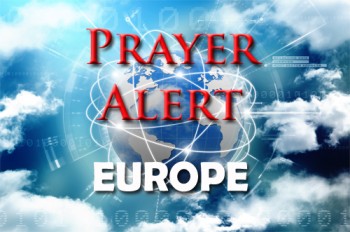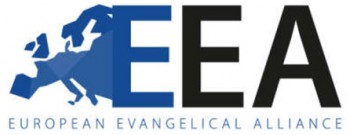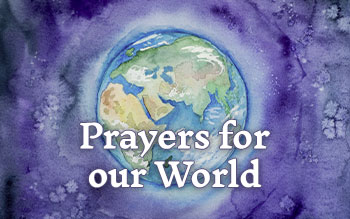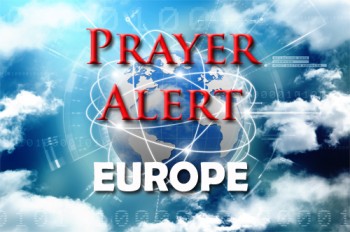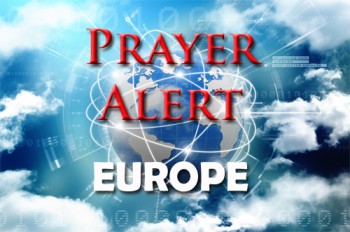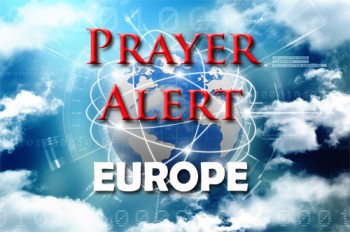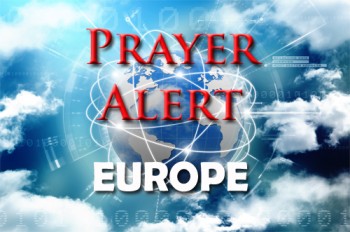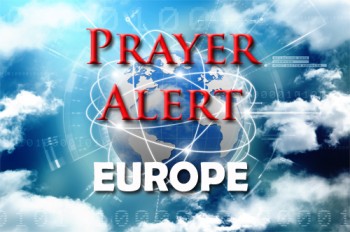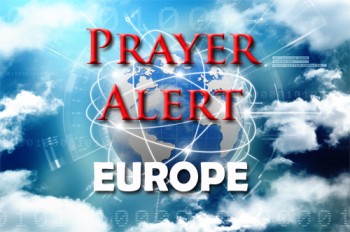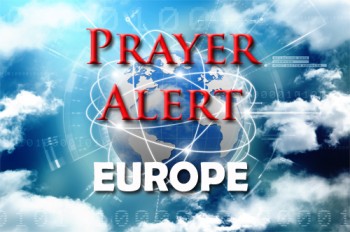Displaying items by tag: Europe
Spain: far-right politics
The Socialists won the recent Spanish election, but far-right party Vox will enter parliament for the first time. Vox opposes multiculturalism, migration, and feminism. Italy's deputy PM from the right-wing League party congratulated ‘our friends in Vox for joining the parliament in Spain’. Its views on immigration and Islam place it in line with far-right and populist parties elsewhere in Europe. With European elections only weeks away, nationalist and far-right parties across Europe are sensing an opportunity for a rise in European nationalism. Italy’s anti-establishment Five Star Movement has common cause with Germany's main opposition party, AfD, the Finns Party, the Danish People's Party (who seize migrants’ property to pay bills), Austria's Freedom Party, France's National Rally, Sweden’s anti-immigration party, and several others, including Nigel Farage’s Brexit party. See
Europe: Praying for the Parliamentary Elections 23-26 May 2019
Christian Responsibility for Europe
Uniting in prayer, hope, reflection and action
Shaping Europe’s future – the European Parliament
The European Parliament can seem remote from daily life but it helps to shape the values and direction of our continent. Through its power to block and amend legislation and to lobby hard for other changes, the European Parliament has huge influence. Between 23rd and 26th May, EU citizens will get the chance to vote and thus collectively choose who will represent them at European level until 2024.
What will the European Union look like in 5 years’ time? What values will European society prioritise? Members of the European Parliament (MEPs) will have a big say over the answers. What challenges will this continent face? MEPs will help choose Europe’s response.
Europe needs prayer
Of course it is always important to pray for politicians (1 Timothy 2: 1-4) and election seasons are especially significant. But, if we step back and look at our continent as a whole, it is clear that Europe is in trouble. So the importance of intercession is huge. Across Europe, fear, division and even anger are common, truth is often getting lost or ignored in the noise. Every nation and the EU institutions themselves are falling short of God’s standards as Evangelicals have historically believed them to be. We have been given good gifts of family, freedom, nation, human rights, security, sex, often relative economic prosperity, etc. but we have turned them into idols as we prioritise them over the Lord or distort them from what he designed them to be. Secularism, meanwhile, makes politics itself an idol and tries to silence other faith-inspired voices. There is also a growing culture of “them versus us” in which many believe that those they disagree with are completely wrong whereas they are completely right. This makes it difficult for people to see good in those who oppose them or to examine their own faults. As a result, wisdom is lost, pride and stubbornness abound.
Hope and responsibility
Individual Christians can feel powerless as they look at these socio-political and economic challenges. We can wonder if there is any point in praying about elections. But, hope returns when we focus our attention on the King of Kings, the one who is in ultimate charge and isworking out His eternal Kingdom purposes no matter what. As we remember that we are called to pray that “His will be done on earth as it is in heaven”, we are motivated to persevere in our intercession. But it also means that we have homework to do – to work to understand what is happening on earth and equally try to understand the will of the Lord. We do this in humility, remembering that we will not fully comprehend until Jesus returns.
Strength in unity
There is particular power and wisdom in praying and reflecting together with other Christians. The diversity of local Church (and indeed Church at national or European levels) means we can choose to understand the lives, problems, gifts and opinions of those who are very different to us. Our identity in Christ gives us a firm foundation for mutual respect, collaboration and the possibility of softening our opinions. We know that, when we pray in humility, repentance and unity for our nations, we can be confident that the Lord listens and will heal (2 Chronicles 7: 14). And when we consider socio-political matters with those who are different to us, it becomes much easier to find a truly biblical perspective on what is important.
A biblical worldview sustains democracy
There is much we can agree on from the Bible. We know that every single human being is made in the image of God and, therefore, has infinite value. So Christians are united in wanting to see European society valuing all, no matter their sex, age, ethnicity, faith or worldview, “economic usefulness”, health or if they are yet to be born etc. As image bearers, every human has the capacity for immense and creative good, so we seek a Europe where there is opportunity for that flourishing contribution from each one. But, since the Fall, each human is capable of unspeakable sinfulness. And so public policy and, indeed, the political system itself must take this into account.
It is this biblical worldview which has provided the foundation for sustainable democracy and free societies.
- Since human beings can do good, they should be able to contribute to the political decision making system and to society.
- Since human beings can do evil, democratic systems should spread power as widely as possible, not allowing any individual or institution to dominate.
- Since every human being has infinite worth, politicians should work for the good of all, including those who did not or could not vote for them.
So let’s be proactive in our praying, voting and influencing to speak up for these core biblical principles and to protect and strengthen the health (in God’s eyes) of our democracy, nations and continent.
Uniting despite differences
As Christians, we should be able to agree on foundational principles of what the Lord would want but there will still be much we continue to disagree on. Since no political party has a monopoly on truth and wisdom, Christians will vote in different ways. But, there is still huge value in praying and discussing together, asking for the Lord’s blessing and mercy, and seeking to understand what is needed for His Kingdom values to be more strongly reflected across our continent.
Therefore, the European Evangelical Alliance urges its members and local churches across the EU to unite in
- non-partisan intercession for our nations and continent,
- biblical reflection about the Lord’s values, listening to other opinions, asking big questions,
- challenging untruth, disrespect and idolatry,
- encouraging people to study political manifestos carefully and to vote.
Politics has its limits
However, no matter how important these elections are, politics becomes an idol when we expect it to solve every issue, give 100% guarantees of security and answer our every need. We look to the King of Kings first, trusting in His sovereignty and ultimate Kingdom purposes. And we also understand the responsibility of citizens to contribute to the common good. Local Church has a particular joyful task to offer the hope of Jesus Christ in word and deed. There is so much anger, fear, loneliness, injustice and hardship around. The Church is doing a vital job in serving communities, reaching out to the most vulnerable, encouraging neighbourliness, building peace, offering hope for today and ultimate hope for eternity. Let’s keep going, whatever happens in political life.
Pray for the European Parliament elections 23-26 May 2019
Christians may vote for different political parties but there is great significance in praying together in humility and unity for our nations and continent.
Here are suggestions for united intercession. We invite people to pray in non-partisan ways
so that all Christians can say AMEN.
Let’s pray for
- the well-being of all candidates and their families during this stressful time,
- peaceful and safe campaigning and voting,
- truth to be sought, seen and heard, valued and accepted,
- opportunities for respectful debate, with a variety of voices being heard,
- growing support for core biblical values, including love, truth, justice, righteousness, forgiveness, integrity, respect, service and generosity,
- the success of politicians who will
- preserve and strengthen democracy and freedom,
- work for the good of all, including the weakest and most vulnerable,
- be a blessing to their nation but also work well with politicians from other nations.
- The next 5 years of the European Union to be a period
- where mutual respect and listening in political debate increase,
- where every Member State of the EU is able to be and to offer its best to the whole and to be humble enough to learn from others,
- where there is greater understanding of the value of every human being,
- where wise and just decisions are made to face the many economic, technological, environmental, social and security challenges Europe faces, and where the weakest are better protected,
- where freedom of religion or belief and of expression are strengthened,
- where decisions are made at the appropriate level – European, national, local,
- where there is a stronger connection and trust between politicians and officials and the citizens of the European Union.
Russia: Religious Clampdown Spreading
MOSCOW - In Verkhnebakansky, a town just outside Novorossiisk on Russia's Black Sea Coast, Baptists gather in a small house with a set of windows in the shape of a Christian cross.
Their presence in the Krasnodar region goes back 110 years, the past 25 of which -- since the Soviet collapse and the opening up of religious expression -- have seen a faith long repressed by authorities flourish once again.
So it was a shock when, on April 7, as some 50 congregants celebrated Annunciation, law enforcement agents stormed in and interrupted the service.
According to presbyter Yevgeny Kokora, the choir temporarily halted its rendition of Jesus Is My Lighthouse while the pastor pleaded with the officers. They wrote up a report and left just as the service was drawing to a close.
The following day, Kokora went with 71-year-old pastor YuryKorniyenko to the prosecutor's office in Novorossiisk, seeking to file an official complaint. They were told the prosecutor wouldn't be taking visitors for the next three weeks. The local branch of Russia's Federal Security Service (FSB) heard the two Baptists out, Kokora told RFE/RL, but made no promises.
On April 9, Korniyenko received a court summons and was subsequently charged with engaging in illegal missionary work. His case will be heard this week, and he faces a hefty fine if convicted.
"This is the first time we've had such troubles," Kokora told RFE/RL in a telephone interview. "I don't understand who needs this, who's playing this card."
While freedom of religion is constitutionally guaranteed in Russia, the relevant legislation names Orthodox Christianity, Islam, Judaism, and Buddhism as the country's four traditional, protected religions. Others with smaller presences in Russia, including denominations like Baptists, have been subjected to increased scrutiny in recent years.
In 2016, Russia introduced a package of laws outlawing missionary work outside officially designated places of worship, part a broader crackdown on minority faiths operating in the country.
The new laws have been cited as necessary measures in the state's fight against extremism and have led to charges against hundreds of religious activists across the country and, in 2017, to an outright ban on Jehovah's Witnesses, a Christian denomination with headquarters in the United States.
Roman Lunkin, a religious expert at the Russian Academy of Sciences, told RFE/RL that the Baptists in the Krasnodar region are falling victim to "not so much an expansion" of the government's campaign against minority religions as "its logical continuation."
The implication, he said, is that the clampdown will spread.
So far, the Baptist church in Russia has kept comparatively under the radar, despite a flock that Lunkin estimates at more than 250,000 people. Its members stand out from those of other minority faiths through their strong "civic stance," Lunkin said -- many are community leaders or members of local government.
But in November, its adherents were shaken by news that a pastor in Tatarstan had been fined 20,000 rubles ($310) for organizing an unsanctioned public gathering: A group of Baptists had assembled that June to watch him baptize their newest member in the Kama River.
Kokora said he believes the campaign against his congregation is a largely local affair, a case of officials trying to curry favor with their superiors. He noted that Novorossiisk has seen several similar cases in recent weeks, but faith groups in other parts of Krasnodar have been largely left alone.
In March, the Pentecostal meeting house in Novorosiisk was torn down after officials declared it an unauthorized construction. Seventh-Day Adventists in the city have been banned from gathering for worship, Kokora said. They now travel to Gelendzhik, 50 kilometers away.
On March 1, law enforcement officers in Novorossiisk detained two Mormons -- Americans KoleBrodowski, 20, and David Gaag, 19 -- on suspicion of violating Russian immigration law. They were released two weeks later and deported to the United States.
The Baptist congregation in Verkhnebakansky has felt pressure from the authorities grow over the past year, according to Kokora. He said they've had weekly calls from officials demanding summaries of the latest sermon delivered, as well as reports on attendance.
On April 21, the deputy head of the Russian Baptist Union, Viktor Ignatenkov, visited Verkhnebakansky to discuss the April 7 incident and the possible legal repercussions for local church members. The meetings "gave everyone a sense of confidence in God's intercession," the church said in a statement on April 23.
Kokora, who spent four years working in the Novorossiisk administration and was a member of the city's civic council, said he is reluctant to try and leverage his official contacts and plans instead to take the legal route by appealing to the Presidential Council for Civil Society and Human Rights in Moscow.
"We have laws, and we have courts. Let's fix this through a legal framework," he said.
That council may be the last hope for groups who feel targeted for their faith.
On December 11, in a meeting with council members, President Vladimir Putin suggested that official policy toward some religions should be liberalized.
"We probably can, and even at some point should, be much more liberal toward representatives of various religious sects," he said.
Putin ordered Supreme Court Justice Vyacheslav Lebedev to oversee the drafting of a general legal framework for adjudicating cases brought against religious groups. The deadline is July 1.
Kokora is among thousands of believers vesting their hopes in the initiative as a chance to reverse what they see as a tightening of the screws on Russia’s minority faiths.
In the meantime, he awaits the court's judgment.
"If this case becomes a precedent, then all our congregations will fall like a house of cards," he said. "The administration's hands will be untied."
Pray for theseefforts of Kokorato succeed -as he challenges the government’soppressive treatment of people due to them practicing their faith.
Pray for the persecuted Christians and their families. May they be richly rewarded for being strong in adversity.
Ukraine election result: Russia’s reaction
Russia's prime minister says there is a chance for improved relations with Ukraine after Volodymyr Zelenskiy, a comedian with no political experience, was elected president in a landslide victory. Russian state media presented the elections as a total mess. However, Russia's lower house of parliament said that ‘there are hopes in Russia that something constructive could come out of the election’. There is a chance for Ukraine to improve relations with Russia with honesty and pragmatism. One of the main problems is the conflict with Russian-backed rebels, in the east of the country, that has so far taken 13,000 lives.
Russia: Kim’s visit
President Vladimir Putin was ‘pleased’ with the outcome of his 25 April meeting in Vladivostok with North Korean leader Kim Jong-un, saying he would discuss the results with his Chinese counterparts when he travels to Beijing later. Many believe that after the diplomatic failure with Trump at Hanoi, Kim wants to prove he is still being sought after by world leaders; he does not want to look too dependent on Washington, Beijing, and Seoul. Also 10,000+ North Korean labourers working in Russia’s logging industry have to leave by the end of 2019, as UN sanctions take effect. The workers provided a revenue stream of hundreds of millions of dollars that Kim’s regime would like to keep flowing. As for Russia, the Putin-Kim summit will reaffirm Moscow's place as a major player on the Korean peninsula, and improve Russian international prestige. See also
France: damaged but still standing
otre Dame suffered desecration during the 1789 French Revolution and was restored by 1804, when it was the venue for Napoleon’s coronation as emperor of France. A restoration project between 1844 and 1864 added the cathedral's iconic spire, which was destroyed in a fire on 15 April when Notre Dame was undergoing renovation. Fortunately the copper statues that were normally on the now collapsed spire had been removed a week earlier in the renovation process, and both towers were also safe, but two-thirds of the roof was destroyed. Many artefacts were saved before the fire spread to other parts of the cathedral. France will invite architects from around the world to submit designs for a new spire that is adapted to the techniques and the challenges of our era, as thoughts turn to how to reconstruct what has been lost. President Macron vowed it will be rebuilt ‘even more beautifully’. See
EU: Macron and US animosity
Emmanuel Macron is launching a bid to block EU/US trade talks because of Donald Trump’s refusal to sign up to the Paris climate agreement. Trump enraged Brussels when he described the EU as ‘brutal trading partners’ in a tweet offering support to Britain after the Brexit summit, which also stated, ‘Things are about to change’. Brussels wants to keep new trade deals simple, but is unsure of unpredictable Trump. The US ambassador to the EU warned that Washington would fight ‘unfair barriers’ against American companies. An official said that France is opposed to the initiation of any trade negotiations with countries outside the Paris climate agreement. This stance is at odds with Germany’s position, and could lead to more friction between Paris and Berlin.
Trump calls EU brutal
The US president called Brussels ‘a brutal trading partner’ and criticised the EU's tough treatment of Britain after it gave the UK a further extension at the special Brexit summit. He finished his critique on a philosophical note, ‘Sometimes in life you have to let people breathe before it all comes back to bite you!’ Brexit talks remain locked, and Brussels has put more pressure on the UK to shift its position. Before the deadlock, former Brexit secretary Dominic Raab told the BBC that allowing a delay weakens the UK’s hand in the talks. Meanwhile many economists believe that as the EU has suffered monetary stagnation and enormous waves of migration, Brussels does not want to lose the UK, its second largest economy and financial centre.
Romania: Christianity v witchcraft
Parts of Romania are hotbeds of the occult and witchcraft, as well as home to large groups of unreached Roma gypsies and Romanians. Witchcraft is a respected (and feared) profession: even the president is known to wear purple on certain days to ward off evil. The witches are known as the vrăjitoare, and their practice is government-regulated. In 2011, a new law required them to pay a 16% income tax, the same as any other self-employed Romanian citizen. The response was twofold. Some supported the tax, arguing that it established witchcraft as a verifiable profession, while others threw poisonous mandrake plants into the Danube River. Meanwhile missionaries are being sent to Romania. Greater Europe Mission (GEM) reported recently that its disciple-makers invited 130 youth from areas rife with witchcraft to a week-long camp, and between 60 and 70 people gave their lives to Christ. See
Poland: Harry Potter books burnt
Priests at a Catholic parish in northern Poland have burnt books, including the Harry Potter series, and other items that their owners said had evil forces. Images from the burning at Gdansk’s Mother of Church parish on Sunday were posted on Facebook by a Catholic foundation that uses unconventional ways of religious work. In the pictures, flames are consuming an African wooden mask, figurines of elephants, and books on personality and magic, as well as those by J K Rowling, all brought in by parishioners. A priest and altar boys watched the book-burning. The foundation said the book-burning was intended to alert parishioners to bad influences which it says come from magic and the occult. Comments under the post condemned the action, recalling that it also happened in Nazi Germany before World War II.
